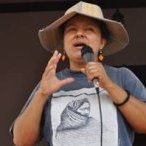
27 May 2013 | Interviews | Criminalization of COPINH | Human rights | Social activists at risk
Illegitimate Operations
Arbitrary arrest and charges brought against Bertha Caceres, leader of the Civic Council of Popular and Indigenous Organizations of Honduras – COPINH
Download: MP3 (1.4 Mb)
On Friday 24, on the 53rd day of the roadblock in Rio Branco carried out by the Lenca indigenous communities in rejection to the Agua Zarca hydroelectric project, two members of COPINH were arrested: Bertha Caceres and indigenous journalist Tomas Gomez, in a context of repression against popular organizations in that Central American country since the coup d’ etat of 2009.
The news were spread immediately at international level, resulting in Tomas release first, and Bertha’s release on Saturday 25, according to Bertha herself in a phone interview with Real World Radio.
Between 15 and 20 Honduran Police and Army officers participated in this operation, described by Bertha as “illegitimate”. The activists were arrested without a warrant and despite the fact that the Inter American Commission on Human Rights issued a precautionary measure in favor of Bertha Caceres after having received multiple death threats.
Despite she was released less than 24 hours later, a complaint was filed by the local prosecutor office that prevents her from leaving the country while her situation clears up.
The project in question is being developed by TNC DESA-SINOHIDRO-FICOSAH (with Chinese and Chilean capitals, among others) and a reservoir will be built to keep the waters of Rio Blanco and Rio Gualquerque. This will force the displacement of Lenca communities and entire populations who have been denied access to their waters since the beginning of the works.
Bertha said that there have been individual and collective human rights violations at the blockade site and that the military officers have been very aggressive with her and with Tomas. After their arrest, there were several assumptions about the leaders’ whereabouts, since their arrest was not recorded at the police headquarters of Santa Barbara municipality.
Tomas also talked to Real World Radio and said that his vehicle was thoroughly searched and despite not having any illegal possessions, they were surrounded, threatened and arrested, in spite of the military forces not having authorization to do so. For this reason the officers called the police, who arrived in vehicles from the company in charge of the building of the Agua Zarca project.
Bertha Caceres was charged with weapon possession, and was ordered to appear at the police headquarters every week and to stay in the country. The trial against the leader will begin on June 13, he added.
“The military officers were the ones who planted the weapon so that they could arrest us, they always look for a way to mess up with our friends”, he added. “If Bertha hadn’t been released, there would have been huge mobilizations in several municipalities”.
Tomas said that they are both alright, that they were not beaten during their arrest and he added that the community response was to strengthen the resistance and continue with the blockade.
“What bothers the regime the most is that communities are mobilizing, far from being afraid, because they are aware of the value of the natural resources of their territories”, said Tomas.
The humanitarian situation in Honduras worsens by the day and the organizations believe that most communities are threatened, militarized and under a permanent state of siege, which will be even worse with the coming presidential elections planned for November.
Photo: Copinh







